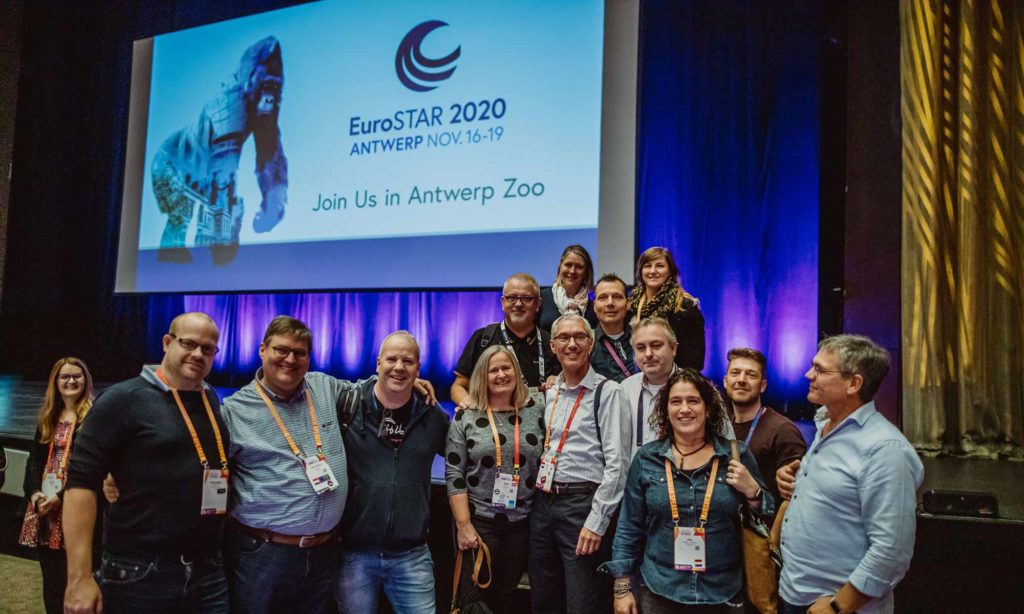The last of the EuroSTAR Sketchnote Reporter blogs summarises the third and final day of the 2019 EuroSTAR Conference started with something new: a Diversity Strikes session on the main stage. This was an opportunity for any conference attendee to speak about diversity and inclusion on the big stage in front of all delegates. All you had to do was complete a short proposal for your talk and submit it to the EuroSTAR Huddle team by Wednesday lunchtime. The Programme Committee then reviewed the many applications and selected 5 people to speak . Though it was hard to choose the 5 speakers, according to Programme Chair, Isabel Evans, I think the choice was spectacular.
The first one on stage was Dermot Canniffe who was talking about his invisible illness: hypersomnia. It leads to a cognition deficit, the urge of wanting to sleep during the day and temporary impairment of memory. Luckily he works in a team that uses BDD. This helps him a lot as he can rely on one single source of truth and find the way through the code base easier. This gives him confidence and by spreading the responsibility throughout the team, he gets included.
The next one to speak was Hanna Dernbrant. She told us about her experience as the only tester in a team. She first dealt with it by attending conferences and becoming part of the community. Then she decided to build an internal community at work of her own. Throughout the whole company there were three testers who now meet on a monthly basis to share their knowledge. From being a minority they became experts in their field. Even though you are alone, you don’t have to be lonely.
The third diversity strikes speaker was Adam Sandman. He appealed to us to give second chances. To look beyond the obvious when you are hiring like different backgrounds or stories. Try to work with people who are new to your working field or who had to take a break from their professional life. We can all make a difference, so give people a chance to show that they can drive your company forward.
Number four on stage was Serena Tosoni. She is somebody who is very interested in diversity. She distinguishes between diversity with others, like gender, culture or background and diversity within ourselves, like you not being yourself at work in comparison to how you are at home. She reminded us that diversity is the art of thinking independently together and that as you are driven by your soul, you should be yourself.
And last but not least there was Veerle Verhagen who took part in a pub quiz where their questions about main characters and their sidekicks. The sidekick to Fox Mulder was Dana Scully – but Veerle wasn’t ok with that as Dana Scully is a main character on her own. When she confronted the quiz master he just responded “you look nice” and went away. Being unhappy about how this went, Veerle turned to the community through the EuroSTAR conference app. The people there were on her side and said that next time they will decide on the questions on their own and not let the quiz master provide the questions. Essentially, if you are unhappy with how something went, reach out to your community and social progress will happen.
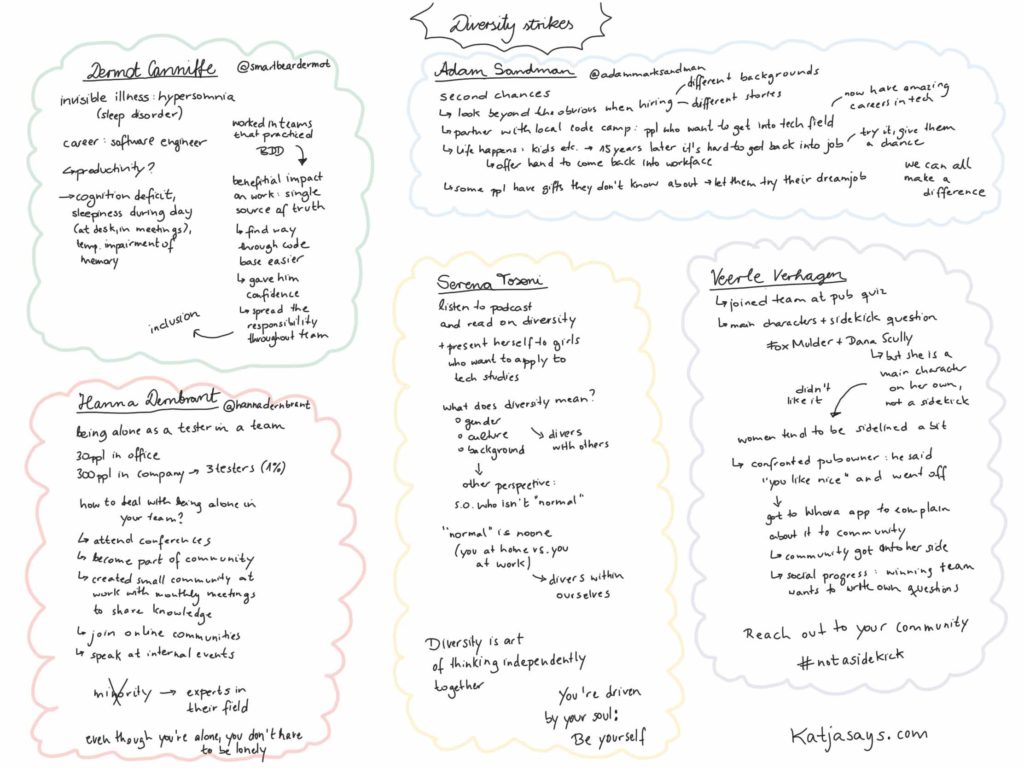
The next talk I attended was “Learning from Bugs” by Henrik Warne. He started to track interesting bugs. For him interesting bugs are the ones of which he thinks “ah, didn’t think of that”. He notes them in a bugs.txt file so that he can review them later and learn from them. He has an entry template with things like date, symptom, cause, how the bug was found, what was the fix in where it has been fixed, what was the cause, how much time he spent to fix the bug and the lessons learned. If you want to start doing this as well, you need to write down the bugs as soon as possible, otherwise you will forget important details. This kind of bug documentation is quite easy to do, helps you to reflect on bugs and you can learn from the lessons.
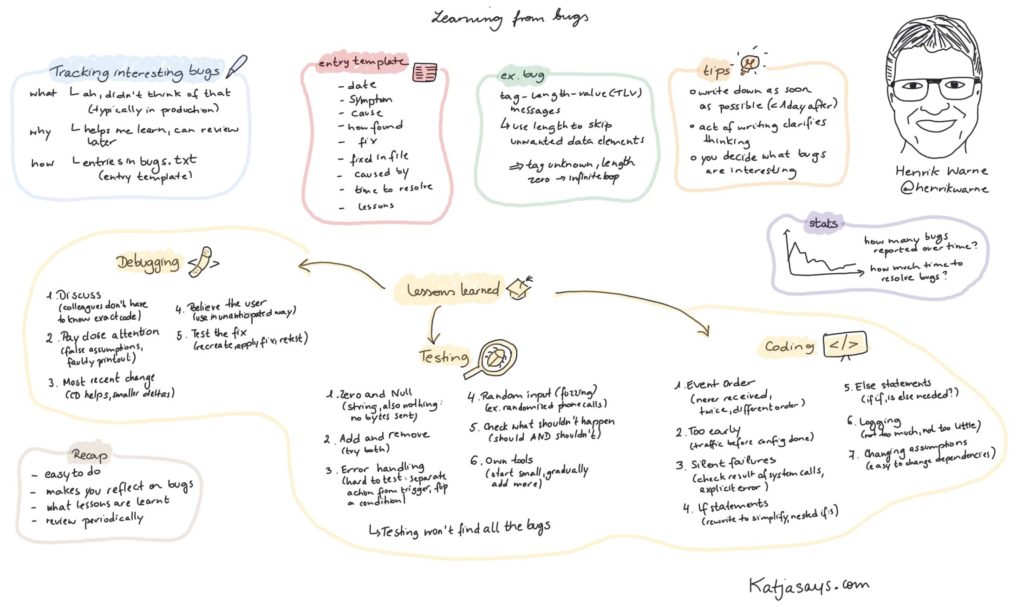
After a coffee break, during which the attendees had, once more, the chance to explore the Expo area and talk to fellow attendees, the next session slot started. I decided to listen to Chloe Burger talks about “Ignite your Inner Innovator – Rebalancing for Testers“. One day Chloe wasn’t able to breathe anymore – the stress was too high and the doctor told her to relax. So she started reading and running and doing other stuff the internet recommended on how to relax. This didn’t work that well. Instead, she concentrated on changing her system to self-heal. One important learning is to be aware of what you are doing. Breathing exercises can help you a lot to calm down. Another tip is to eat happiness – for being happy, people need serotonin. Serotonin is produced by tryptophan which the people have to obtain with food. If you want to beat your system, Chloe recommends asking why, discuss your feelings and find your way from frustration to inspiration.
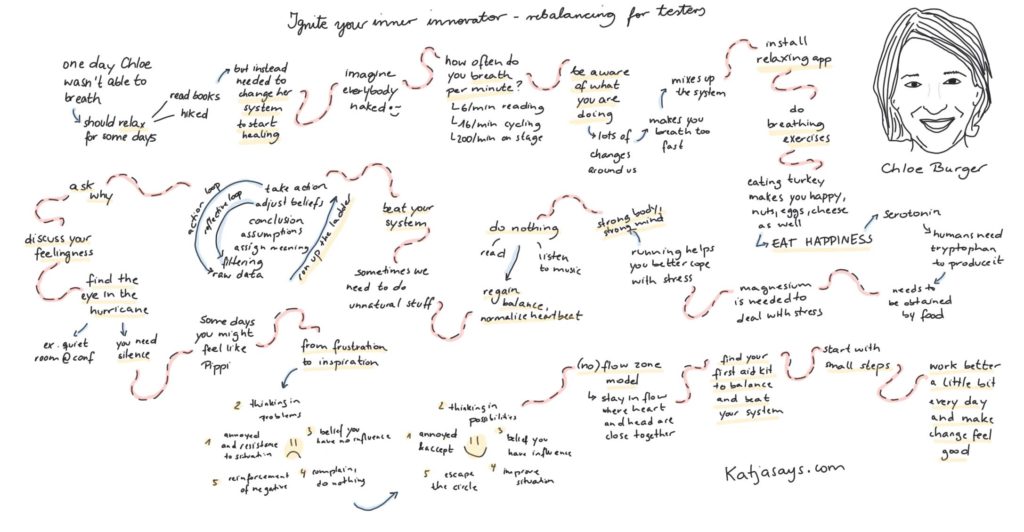
Now the time for the last keynote came. It was titled “Be the Lord of Your OWN Rings: Build Your OWN Insider Testing Program” and held by Dona Sarkar. Dona works at Microsoft and is part of the Windows Insider Program. Microsoft wanted to try a new process – not creating for the customers, but co-creating with them, because they thought that having a lot of users is a superpower. They learned that everyone has a problem, ideas for a solution and wants to be part of a community. So they have built the Windows Insider Program, a tribe with three rules:
- the mission to build the best Windows for everyone in the world
- Twitter being the place to communicate
- the CTA: install build, send feedback
Now they release test builds to the Insider, receive their feedback, build it in and close-the-loop and engage the community. They have built a culture of experiment and learn. The interesting part in all of this is to build and nurture the community. So Dona’s tips for that are:
- have clear WHY they should invest (benefits)
- co-create with them
- be their advocate and celebrate their wins
- share your stage
- have inside jokes and symbols
- meet regularly virtually or in-person
- be vulnerable and make it safe for them to be vulnerable
- keep learning together
- build for teamwork
- unlock creativity and embrace shenanigans
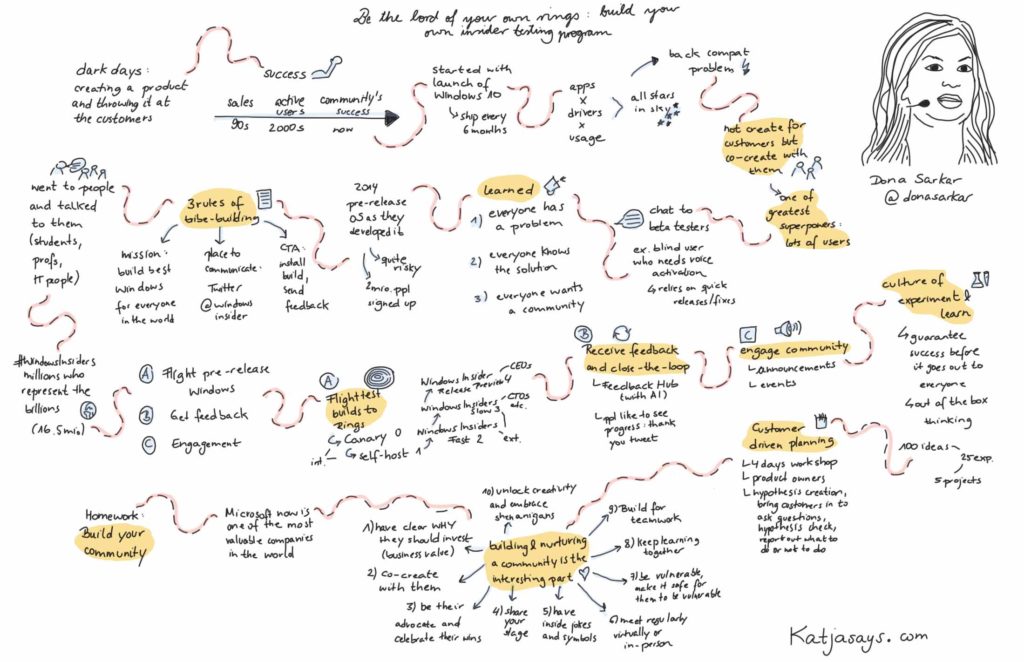
After the lunch break there was the choice to either attend a workshop or attend the do over sessions – the sessions that are most highly rates by the attendees. You can rate more than once but only your most recent rating is saved by the app. As I haven’t seen the two winners of the EuroSTAR Do-Over sessions yet, I decided to attend those.
The first Do-Over winner was “Finding and Developing Software Testers – Lessons from a Testing Start-up” by Phil Royston. Phil is the opinion that testing is (still) done by people. Therefore, you need a people strategy. You need to forecast demand and supply, attract great people, educate and upskill and also retain them. Being a good software tester from the view of business is someone who does a job that fulfills the customer’s need or solves a problem. Colleagues say, that a good software tester has to do the job effectively and efficiently. Software testing consists of technical work, people work and team work. One of the essential parts of being a great tester is having a growth mindset. Companies have to work with the motivation of their employees. These can be:
- psychological & safety: money, bonuses, benefits, things
- equity: fairness
- autonomy & self-will: the urge to direct one owns life
- relationships
- mastery: getting better (at things that matter)
- recognition & appreciation
- purpose
If you want to be a good leader, you need to give recognition, don’t talk, but listen, build trust and relationships, give feedback (well) and delegate and elevate.
The second Do Over Winner was “DevOps: Test Alone“, held by Bjorn Boisschot. In the last few years, according to Bjorn there haven’t been lots of changes in the way we test things. A tester from the 70’s might actually be a tester nowadays. To survive we need to adapt our testing efforts from being re-active to being pro-active. We need to focus on delivering value to everyone being a part of the software cycle. Testing should be adopted as a strategy, not a task. Soft skills play a very important role in that. Also, DevOps practices like containerization or code quality have to be embraced. Production needs to be leveraged and experimentation should play a role.
That was actually it – the EuroSTAR Conference 2019 was over way too fast!!
I really enjoyed being there. The location, Prague Congress Center, was lovely, the speakers were amazing and the talks had a great quality. I’m very much looking forward to next year’s edition in Antwerp. And who knows: Maybe I will be there as a sketchnoter once again.

